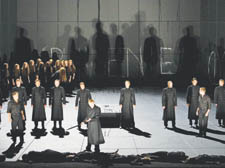|
|
 |
| |
| |
Best to Gluck away!
REVIEW: IPHIGENIE EN TAURIDE
Royal Opera House
THE Royal Opera season opened with Gluck’s 1779 opera, Iphigénie en Tauride, revolutionary in its time, and the culmination of his operatic reforms.
Not seen at Covent Garden since 1973, the austere score, based on the play by Euripides, is free of ornament, with a nearly continuous musical line. Director Robert Carsen’s radical production, shared with San Francisco and Chicago Opera houses, take its cue from the simplicity that Gluck strove for.
Tobias Hoheisel’s single set is a stark black cube superbly lit by Peter van Praet, with simple black modern costume. It should free the singers to bring out the dramatic intensity of the nightmare world of fear and human sacrifice inhabited by Iphigenia and her brother, Orestes.
However its power is diminished by the common fault of today’s directors: never allowing the characters to be still. Every bar is filled with agitated movement from the overture onwards.
The troupe of dancers representing the chorus (singing from off stage) are fussily directed by Phillipe Giradeau. The singers rush around the stage, sometimes to the detriment of their singing, and even, at one point, literally walking up the wall. Some strange enunciation from this cast of non-French singers was also problematic.
Susan Graham, in the title role, does not carry sufficient conviction. Her voice is beautiful in the middle section but lacks colour and variety, and does not maintain that rich impassioned tone throughout the range, especially in the classically structured climaxes.
Simon Keenlyside, as Orestes, conveyed the pride and anguished torment through beautiful, eloquent singing. Tenor Paul Groves brought ringing tone to the role of Pylades, but Clive Bayley as the barbaric King Thoas was a rather rough-toned caricature. Smaller supporting roles were all well taken.
The Orchestra of the Age of Enlightenment under Ivor Bolton sounded underpowered, giving little inkling as to why this opera is considered so important.
HELEN LAWRENCE |
 |
|
| |
|
|
 |
|








